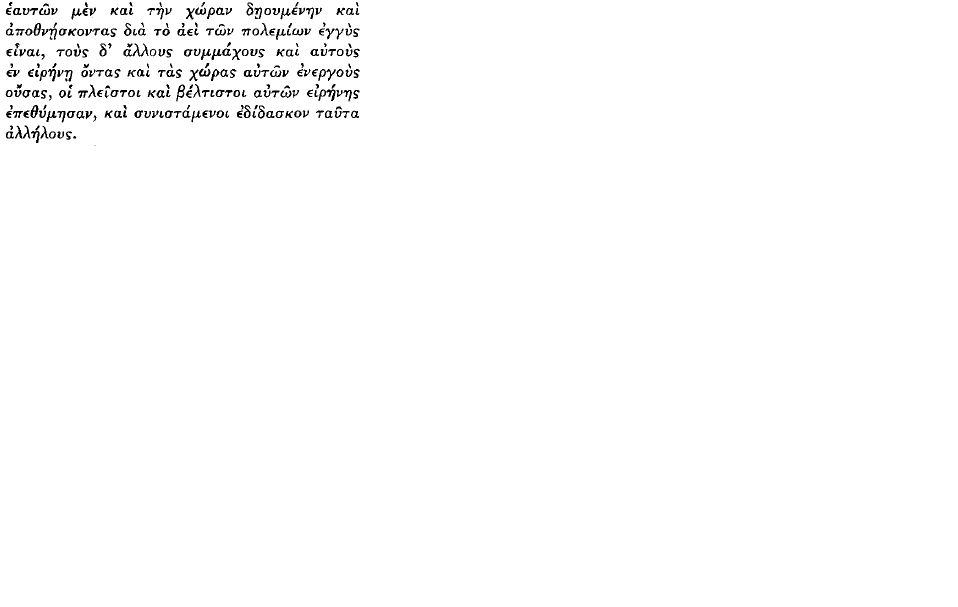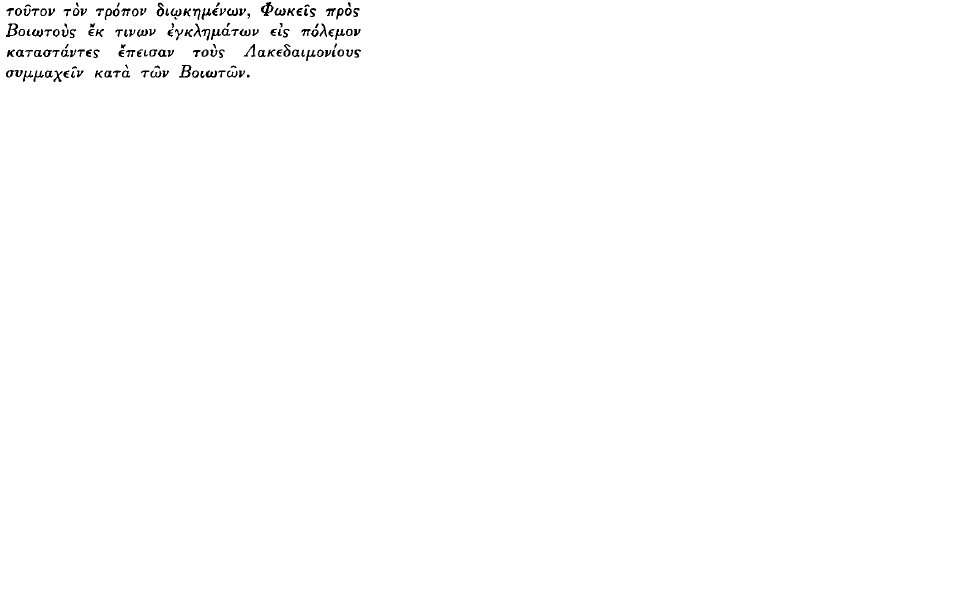Published online by Cambridge University Press: 11 February 2009
The causes and the outbreak of the Corinthian war, as well as the events immediately preceding it, have often been discussed by modern historians. Since the Corinthian war is the first attempt at achieving a new settlement in Greece after the Peloponnesian war and since it brought about new political alliances and the revival of old imperial rivalries, it is not only an episode in the continual warfare among the Greek states, but may also be regarded as a key to the understanding of a part, at least, of the pattern of Greek history in the fourth century B.C.
page 64 note 2 For the enumeration of the causes in the order of their importance see Beloch, J., Griechische Geschichte, iii. i2 (Berlin, 1922), pp. 61–68.Google Scholar See also Ed. Meyer, , Theopomps Hellenika, Halle, 1909Google Scholar (henceforth quoted as Th. H.), pp. 47–48;Google Scholar and Geschichte des Altertums, v4 (Basel), 1958, pp. 182–224;Google ScholarAccame, S., Ricerche intorno alia guerra corinzia (Napoli, 1951), pp. 21–32;Google ScholarCloche, P., Thebes de Béotie (Namur, 1951), pp. 95–103;Google ScholarGlotz-Cohen, , Histoiregrecque iii (Paris, 1941), pp. 78–81.Google Scholar
page 64 note 3 This is regarded as the main cause of the war by Bengtson, H., Griechische Geschichte 2, (H. d. A. W.), 1960, p. 258;Google Scholar cf. Ed. Meyer, , Th. H., p. 48.Google Scholar
page 64 note 4 See Jacoby, F., F. Gr. H. ii C, pp. 8–10,Google Scholar for a discussion of this chapter of Hell. Oxy. See also Accame, S., loc. cit.;Google ScholarBusolt, G., ‘Der neue Historiker und Xenophon,’ Hermes xliii (1908), 255–85,Google Scholar is almost alone in maintaining that Xenophon is a far better and more reliable source than Hell. Oxy.
page 64 note 5  in Hell. Oxy. 2. 2, and the final conclusion in 2. 5.
in Hell. Oxy. 2. 2, and the final conclusion in 2. 5.
page 64 note 6 Hell. Oxy. 2. 3–4.
page 64 note 7 Ibid. 2. 2: 

page 65 note 1 Hell. Oxy. 2. 2. It should be pointed out here that the author of Hell. Oxy. is quite consistent in his account. The Athenian democratic demagogues started their anti-Spartan propaganda and activities even before the arrival of Timocrates in Greece, see 1. 3–2.1. Busolt, G., op. cit., p. 275Google Scholar, says that what Hell. Oxy. relates about the democratic leaders is a copy of the judgement of Thucydides on Cleon's policy.
page 65 note 2 The Hell. Oxy. does not contain any information as to the internal affairs of Argos or Corinth.
page 65 note 3 Hell. Oxy. 12. 1; cf. 11. 1.
page 65 note 4 Ibid. 1–2; cf. Xen. Hell. 5. 2. 25. This is rightly pointed by Cloché, P., op. cit., p. 97.Google Scholar It is difficult to see in the hoplites and cavalrymen who rejoice at the fall of Leontiades (Xen. Hell. 5. 4. 9) in 379 a democratic party. Xenophon does not mention at all Spartan interference or internal party strife in Thebes or in the other Greek states. He mentions the enmity between Leontiades and Ismenias later in connexion with Phoebidas' capture of the Theban acropolis (Xen. Hell., 5. 2. 25–26; Diod. 15. 20).
page 65 note 5 Xen. Hell. 2. 2. 1–2; Diod. 14. 6. 3, 32. 1–2; Lys. 12. 95, 58; Justin 5. 9. 8; Xen. Hell. 2.4. 30; cf. 3. 5.8,5. 2. 33; subsequently Thebes refused help to Sparta in her war against Elis, Xen. Hell. 3. 2. 25, 30; Diod. 14. 17. 7. But the Thebans did not actively oppose the passage of the Spartans on their way to Thessaly, Diod. 14. 38. 3–4; cf. 82. 6. After the internal settlement in Athens and until the attack on Agesilaus Theban resistance was passive only.
page 65 note 6 Xen. Hell. 3. 5. 3; Plut. Lys. 27; Justin 5. 10. 12–13.
page 65 note 7 Hell. Oxy. 12. 3–5.
page 65 note 8 Ibid. 12. 2; cf. Xen. Hell. 3. 5. 3. Ed. Meyer, , G.d.A. v4, p. 209,Google Scholar seems to think that Ismenias gained power immediately after the Peloponnesian war. The strength of Ismenias' party may be seen from the fact that even after the King's Peace he serves as polemarch with Leontiades, and Thebes even refuses to send troops for the Spartan campaign against Olynthus. Cloché, P., ‘La Politique thébaine de 404 à 396 av. J.-C.’Google Scholar, R.É.G. xxxi (1918), 315–43,Google Scholar suggests that until 395 the two parties were of equal strength and the position was similar to that in 382 when Leontiades could not prevent the decision to refuse help to Sparta against Olynthus. But in 382 Leontiades seizes power only after he calls in the Spartans and after Ismenias is imprisoned. Ismenias is then condemned and his supporters flee to Athens. Ismenias himself was not in need of such drastic measures at the outbreak of the Corinthian war. His faction was probably strong enough. Kagan, D., P.d.P. lxxx (1961), 330–32,Google Scholar follows Cloché Neither paid attention to the difference between the previous completely passive resistance to Sparta and the attack at Aulis, when the Boeotarchs must have considered the possibility of a Spartan countermeasuxe.
page 65 note 9 Xen. Hell. 3. 4. 4; Plut. Ages. 6. 6; that Thebes refused to join in the expedition of Agesilaus is obvious, Xen. Hell. 3. 5. 5.
page 65 note 10 13, 1 


page 66 note 1 Was the author of Hell. Oxy. under the influence of the Phoebidas affair ?
page 66 note 2 Hell. Oxy. 13. 2; cf. Xen. Hell. 3. 5. 3.
page 66 note 3 Ibid. 3. 4. 2–3; Plut. Ages. 6. 4–5, 9. 4, 16. 4, 40. 2.
page 66 note 4 Hell. Oxy. 13. 4; see also Xen. Hell. 3. 5. 5–7; and Jacoby, F., op. cit., p. 17.Google Scholar
page 66 note 5 Tod 101.
page 66 note 6 Hell. Oxy. 13. 4 and Paus. 3. 9. 11 relate attempts at arbitration. According to Hell. Oxy. the Boeotians if they have any grievances should submit to the judgement of Sparta and her allies. According to Pausanias the Athenians, foreseeing the development of events, send an embassy to Sparta asking Sparta to refrain from the use of arms and put their grievances before a court of arbitration. The two accounts are not contradictory. What is quite obvious is that both proposals were unacceptable to the opposite party. For Ismenias the acceptance of the Spartan proposal would have been tanta mount to recognition of Spartan hegemony and  while the acceptance of the Athenian proposal by Sparta would have been an acknowledgement on Sparta's part of her failure as hegemon. Both proposals were probably of propaganda value in accusing the opponent of responsibility for the outbreak of the war. I cannot see any justification for Beloch's opinion (Gr. Gesch. iii. i2, p. 27, n. 2Google Scholar) that the Spartans genuinely hoped that their proposals would be accepted. Xenophon, who speaks of the Spartan eagerness for war, is consistent in his views when he does not even mention the proposals for arbitration, see Accame, S., op. cit., p. 25.Google Scholar
while the acceptance of the Athenian proposal by Sparta would have been an acknowledgement on Sparta's part of her failure as hegemon. Both proposals were probably of propaganda value in accusing the opponent of responsibility for the outbreak of the war. I cannot see any justification for Beloch's opinion (Gr. Gesch. iii. i2, p. 27, n. 2Google Scholar) that the Spartans genuinely hoped that their proposals would be accepted. Xenophon, who speaks of the Spartan eagerness for war, is consistent in his views when he does not even mention the proposals for arbitration, see Accame, S., op. cit., p. 25.Google Scholar
page 66 note 7 Hell. Oxy. 1. 2–3.
page 66 note 8 Cloché, P., ‘Les Conflits politiques et sociaux à Athènes pendant la guerre corinthienne (395–387)’Google Scholar, R.É.A. xxi (1919), 158,Google Scholar quotes Xen. Hell. 2. 4. 40 and Lys. 25. 18 for the split in Athenian society before 395. See also Aristoph. Eccl. 197–8. At p. 160 Cloche points out that Epicrates was out to enrich himself and that Lys. 27. 9–10 supports the statement of Hell. Oxy. But it seems a justified conclusion from Lys. 27 that Epicrates was probably acquitted of the charge of embezzling money. See Sealey, R., Historia v (1956), 180.Google Scholar If so the accusation of Hell. Oxy. 2. 2 seems to be, at least, tendentious. It is undoubtedly true that there were people who became rich during die Corinthian war, e.g. Aristophanes, an ardent supporter of Conon: see Lys. 19. 19–20, 28–29. It is probably not less true that accusations of embezzlement were quite frequent, as they were all through the fourth century. Sealey, , p. 179,Google Scholar also stresses the fact that in 392/1 Epicrates recommended peace and was one of the envoys to Sparta. In his ‘Notes sur la politique athénienne au début du ive siecle’, in R.E.A. xliii (1941), 16–32,Google Scholar P. Cloché discusses the tendencies towards peace and the propaganda conducted in Athens against war and imperialistic expansion. For the period before the Corinthian war Cloché relies chiefly on the Gorgias of Plato which, he maintains, was written in 393/2. He points out the fact that the adherents of a peace policy came mostly from the circle of Socrates.
page 67 note 1 Diod. 14. 32. 5; they thus formed a third group in between the  and the
and the  see also Ed. Meyer, , Th.H., pp. 49–51.Google Scholar
see also Ed. Meyer, , Th.H., pp. 49–51.Google Scholar
page 67 note 2 See Sealey, R., ‘Callistratos of Aphidna and his contemporaries’, Historia v (1956), 178–203.Google Scholar
page 67 note 3 In 388/7 and 387/6 Demaenetus is among the commanders in Aegina and in the Hellespont, Xen. Hell. 5. 1. 10, 26. Accame, S., op. cit., p. 138,Google Scholar maintains that Demaenetus was among the Athenian radicals who came to power in Athens after the death of Thrasybulus. Athens did not react to the execution in Sparta of her ambassadors to the Persian king: Hell. Oxy. 2. 1. But the first expression of an attempt at achieving some independence in foreign policy made by Athens may be seen in the two decrees (Tod 97, 98) from the year 403/2 or the years immediately following, honouring the Samians and restoring the proxenia of Thasians. Though the decrees were of no political consequence (Meyer, E., G.d.A. v4, p. 49Google Scholar), they were certainly an expression of the feelings prevalent in Athens at the time (see C.Q. N.S. viii [1958], 188Google Scholar). For an expression of dissatisfaction with Athenian loyalty to Sparta see Lys. 18. 15.
page 67 note 4 Tod 101, Xen. Hell. 3. 5. 16. Though Andoc. 3. 25 is tendentious, it is quite probable that Thebes' attitude was of some influence on the decision taken at Athens; see also Andoc. 3. 13. But it certainly was not the only or decisive moment, for Athens was primarily interested in the Aegean; see Cloché, P., R.é.A. (1919), 163–5.Google ScholarAccame, S., op. cit., pp. 26–27,Google Scholar points out that the rejection of the Athenian proposal for arbitration may have influenced the decision of Thrasybulus. On pp. 49–51 he argues that the Athenians were afraid that Agesilaus' victory would strengthen Sparta's domination and that Thrasybulus saw a chance of success because of the Boeotian alliance and Persian help. But Accame is wrong in considering the Boeotian-Athenian alliance as the first hostile step against Sparta. Since the alliance was defensive only, it was a sequence to the refusal to furnish troops for Agesilaus' Asian campaign.
page 67 note 5 See Beloch, J., Die attische Politik seit Perikles (Leipzig, 1884), pp. 115–17Google Scholar; Cloche, P., R.É.A. xxxii (1919), 162, 170–4;Google ScholarBernert, , R.-E. 2. R. vi. 573;Google Scholar and Sealey, R., op. cit., p. 179. For Aesimus' adherence to a policy of Athenian imperial expansion see Tod 118, 122.Google Scholar
page 67 note 6 Paus. 3. 5. 4. Accame, S., op. cit., pp. 46–47, quite rightly reckons that the period of time whicn elapsed between tne Phocian-Locrian clash (May 395) and the battle of Haliartus (August 395) was very short. Athens was probably ready for war when the Boeotian envoys appeared in Athens.Google Scholar
page 68 note 1 Hell. Oxy. 2. 1; cf. Isocr. 4. 142, Isaeus 11. 8; cf. Dem. 43. 31, F. Gr. H. 324 (Androtion), F. 18; 328 (Philochorus), F. 147; cf. Ctesias, in Phot. Bibl., pp. 44b20–42; Plut. Artax. 21.Google Scholar
page 68 note 2 Athens sent troops for the war against Elis, Xen. Hell. 3. 2. 25; cf. Diod. 14. 17. 7. Athens sent 300 cavalry with Thibron, Xen. Hell. 3. 1.4; but it should be remembered that she thus got rid of a strong anti-democratic opposition.
page 68 note 3 Thuc. 5. 28. 1–2; 29. 1.
page 68 note 4 Ibid. 78–82; Diod. 12.80; Plut. Alcib. 15.
page 68 note 5 Thuc. 5. 82–84; cf. 116. 1, Diod. 12. 80–81, Plut. Alcib. 15.
page 68 note 6 Xen. Hell. 2. 4. 30, 5.12, Justin 5. 10. 12.
page 68 note 7 Xen. Hell. 3. 2. 25.
page 68 note 8 Diod. 14. 36. 2; Corinth is the meeting place of the Spartan allies. Xen. Hell. 3. 1. 4 speaks only of 4,000 Peloponnesians.
page 68 note 9 Paus. 3. g. 2.
page 68 note 10 Xen. Hell. 3. 4. 1, Paus. 3. 9. 8.
page 68 note 11 2. 3; cf. Xen. Hell. 4. 2. 10, Jacoby, F., op. cit., p. 18.Google Scholar
page 68 note 12 Xen. Hell. 3. 5. 17, 23; Diod. 14. 82, 1; Andoc. 3. 21.
page 68 note 13 Paus. 3. 9. 8 
 It should be stressed that the contrast between Timolaus and the other Corinthians opposing Sparta in Hell. Oxy. 2. 3 does not mean that here is an oligarchic leader who because of a personal grudge joined the democratic party. Polyanthes also fought on the side of Sparta in the Decelean war (Thuc. 7. 34), and see Schaefer, H., R.-E. xxii (1952), 1436.Google Scholar It should be remembered that the basis of the accession of Corinth to the anti-Spartan coalition was not the alliance with Argos, but a defensive treaty with Boeotia and Athens. See Tod 102
It should be stressed that the contrast between Timolaus and the other Corinthians opposing Sparta in Hell. Oxy. 2. 3 does not mean that here is an oligarchic leader who because of a personal grudge joined the democratic party. Polyanthes also fought on the side of Sparta in the Decelean war (Thuc. 7. 34), and see Schaefer, H., R.-E. xxii (1952), 1436.Google Scholar It should be remembered that the basis of the accession of Corinth to the anti-Spartan coalition was not the alliance with Argos, but a defensive treaty with Boeotia and Athens. See Tod 102  , and Accame, , op. cit., pp. 55, 59–60.Google Scholar There seems to be no doubt that the party of Ismenias was not democratic. This was probably of great help to Timolaus and Polyanthes in bringing Corinth openly to the antiSpartan side.
, and Accame, , op. cit., pp. 55, 59–60.Google Scholar There seems to be no doubt that the party of Ismenias was not democratic. This was probably of great help to Timolaus and Polyanthes in bringing Corinth openly to the antiSpartan side.
page 69 note 1 After the battle of Nemea, Xen. Hell. 4. 2. 23; Dem. 20. 52–53. That this could not have been an attempt to seize the city is proved by the lack of repercussions afterwards and by Corinthian participation in the batde of Coronea. The assembly was probably persuaded at first, but the decision was revoked very soon.
page 69 note 2 Xen. Hell. 4. 4. 1–7; Diod. 14. 86. 1–2; cf. Andoc. 3. 26.
page 69 note 3 Xen. Hell. 4. 4. 

page 69 note 4 Ibid. 6.
page 69 note 5 Diod. 14. 86. 
 According to Griffith, G. T., ‘The Union of Corinth and Argos’, Historic i (1950), 236–56,Google Scholar there were three stages: (1) a democratic revolution in 392; (2) an isopolity agreement between Corinth and Argos immediately after the revolution; (3) the union with Argos in 389 by which Corinth was incorporated in Argos. That the stasis in 392 was a democratic revolution Mr. Griffith deduces from Hell. Oxy., which he himself calls a ‘suggestion’ (p. 241). For a criticism of Mr. Griffith's chronology see Accame, S., op. cit., pp. 107–10.Google Scholar The exiles from Corinth in 375 (Diod. 15. 40. 3) living in Argos cannot have been democrats. They might have been the members of the anti-Spartan, pro-war party. Kagan, D., P.d.P. lxxx (1961), 333–41,Google Scholar comes to the conclusion that die change in Corinth which precipitated its joining the anti-Spartan coalition coincided with the mission of Timocrates. The change itself was a coalition between the merchant-oligarchic party with the democratic party. Kagan's arguments for the existence of a strong democratic party in Corinth are based on general considerations of the economic decline of Corinth in the second part of the Peloponnesian war; even so, he suggests that the leaders and a great number of the members of the democratic party came from among the impoverished merchants. The two passages he quotes—Plut. Ages. 15. 6 and Xen. Hell. 3. 5. 2—do not refer to Corinthian democratic leaders. In his ‘Corinthian Politics and the Revolution of 392 B.C.’, Historia xi (1962), 447–57,Google Scholar Kagan again repeats his theory of the three parties and maintains that Hell. Oxy. 2. 2–3 shows that since there was an anti-Spartan party, it must have been a democratic one (p. 449 n. 10). As in the case of Thebes this equation is not at all self-evident.
According to Griffith, G. T., ‘The Union of Corinth and Argos’, Historic i (1950), 236–56,Google Scholar there were three stages: (1) a democratic revolution in 392; (2) an isopolity agreement between Corinth and Argos immediately after the revolution; (3) the union with Argos in 389 by which Corinth was incorporated in Argos. That the stasis in 392 was a democratic revolution Mr. Griffith deduces from Hell. Oxy., which he himself calls a ‘suggestion’ (p. 241). For a criticism of Mr. Griffith's chronology see Accame, S., op. cit., pp. 107–10.Google Scholar The exiles from Corinth in 375 (Diod. 15. 40. 3) living in Argos cannot have been democrats. They might have been the members of the anti-Spartan, pro-war party. Kagan, D., P.d.P. lxxx (1961), 333–41,Google Scholar comes to the conclusion that die change in Corinth which precipitated its joining the anti-Spartan coalition coincided with the mission of Timocrates. The change itself was a coalition between the merchant-oligarchic party with the democratic party. Kagan's arguments for the existence of a strong democratic party in Corinth are based on general considerations of the economic decline of Corinth in the second part of the Peloponnesian war; even so, he suggests that the leaders and a great number of the members of the democratic party came from among the impoverished merchants. The two passages he quotes—Plut. Ages. 15. 6 and Xen. Hell. 3. 5. 2—do not refer to Corinthian democratic leaders. In his ‘Corinthian Politics and the Revolution of 392 B.C.’, Historia xi (1962), 447–57,Google Scholar Kagan again repeats his theory of the three parties and maintains that Hell. Oxy. 2. 2–3 shows that since there was an anti-Spartan party, it must have been a democratic one (p. 449 n. 10). As in the case of Thebes this equation is not at all self-evident.
page 70 note 1 Xen. Hell. 4. 8. 34; Diod. 14. 92. 1.
page 70 note 2 For the failure of Hell. Oxy. in dealing with the internal affairs of Athens see Ed. Meyer, , Th. H., pp. 50–51. See also p. 76 n. 1Google Scholar
page 70 note 3 Ed. Meyer, , Th. H., p. 58;Google ScholarJacoby, F.: op. cit., p. 6;Google ScholarAccame, S., op. cit., pp. 5–20:Google ScholarMess, A. v., ‘Die Hellenika von Oxyrhyncho; und die Berichte Xenophons und Diodors’, Rh.M. lxiv (1909), 235–46.Google Scholar
page 70 note 4 Jacoby, F., op. cit., p. 16;Google Scholar cf. Accame, S.' op. cit., p. 20.Google Scholar
page 70 note 5 e.g. Hell. Oxy. 14.  Diod. 14. 81. 4
Diod. 14. 81. 4  .
.
page 70 note 6 Diod. 14. 81. I 

page 71 note 1 Diod. 14. 9. 1, 11. I, 17. 4, 37. 5, 38.6, 79. 4, 92. 1.
page 71 note 2 Diodorus calls the first part of the war  (14. 81. 3) and then speaks of the
(14. 81. 3) and then speaks of the  (14. 86. 6).
(14. 86. 6).
page 71 note 3 Ed. Meyer, , Th. H., p. 44,Google Scholar suggests that Ephorus omitted it on purpose in order to clear Athens and Thebes.
page 71 note 4 Diod. 14. 82. 2.
page 71 note 5 Ibid. 3: Euboea, Leucas, Acarnania, Ambracia, and the Chalcidians of Thrace.
page 71 note 6 Ibid. 4.
page 71 note 7 Ibid. 2.
page 71 note 8 Ibid. 39. 3.
page 71 note 9 See Delebecque, E., Essai sur la vie de Xénophon (Paris, 1957), pp. 256–87.Google Scholar
page 71 note 10 The battle of Cnidus is mentioned because Agesilaus gets news of it, Xen. Hell. 4. 3. 10–14. The naval campaign after Cnidus: Xen. Hell. 4. 8. See Delebecque, E., op. cit., pp. 268–70.Google ScholarBreitenbach, H. R., Historiographische Anschauungsformen Xenophons (Diss. Freiburg, 1950), p. 21Google Scholar andn. 13, sees in Hell. 4. 8. 1 one of Xenophon's programmatic declarations on his way of writing history.
page 71 note 11 Xen. Hell. 3. 5, cf. 1–2; Polyaen. 1. 48 and Jacoby, F., op. cit., p. 8.Google Scholar There is almost a consensus of opinion among modern scholars against Lenschau, Th., ‘Die Sendung des Timokrates und der Ausbruch des korinthischen Krieges’, Phil. Woch. lv (1933), 1325–8,Google Scholar that Xenophon is mistaken in putting the event in 394 instead of in the summer of 396. For a discussion of the date see Accame, S., op. cit., pp. 29–30. Since Xenophon omitted the naval war, he could not account for the time that elapsed between the mission of Timocrates and the outbreak of the war. The sending of Timocrates may have been one of the consequences of the defection of Rhodes.Google Scholar
page 72 note 1 Jacoby, F., op. cit., p. 9.Google ScholarAccame, S., op. cit., pp. 31–32, maintains that this is due to a later revision.Google Scholar
page 72 note 2 Xen. Hell. 3. 5. 3–5.
page 72 note 3 Ibid. 5; cf. Isocr. 14. 27. The Thebans also act  when Pausanias leaves Boeotia, Xen. Hell. 3. 5. 24.
when Pausanias leaves Boeotia, Xen. Hell. 3. 5. 24.
page 72 note 4 See Accame, S., op. cit., p. 38.Google Scholar
page 72 note 5 Hell. 3. 5. 3; see above on Hell. Oxy. 13. 2 and cf. Jacoby, F., op. cit., p. 17.Google Scholar
page 72 note 6 Xen. Hell. 3. 5. 8–15. See Jaeger, W., Demosthenes (Berkeley, 1935), p. 10 and p. 208,Google Scholar n. 12; Accame, S., op. cit., pp. 43–45;Google ScholarBreitenbach, H. R., op. cit., pp. 133–5;Google ScholarDelebecque, E., op. cit., pp. 251–2, 256, 264–5.Google Scholar
page 72 note 7 Xen. Hell. 3. 5. 12–13; see the contrast between  and
and  Cf. Isocr. 4. 110–14, and Lotze, D.,
Cf. Isocr. 4. 110–14, and Lotze, D.,  , Historia xi (1962), 427–35.Google Scholar
, Historia xi (1962), 427–35.Google Scholar
page 72 note 8 There is no reference to any present interference; the whole passage refers to Lysander's system and thus, perhaps, to the fear of a possible revival of that system.
page 72 note 9 Xen. Hell. 3. 5. 16; cf. Tod 101. Accame, S., op. cit., pp. 41–42,Google Scholar points out that Xenophon inaccurately substitutes ‘Thebans’ for ‘Boeotians’ of the original treaty and that, therefore, Athenian help could be invoked only if Thebes herself was attacked. But see Tod, ii. 14. Where Accame is undoubtedly right is in pointing out that the Athenian-Theban alliance was the actual declaration of war, op. cit., p. 46.Google Scholar
page 73 note 1 Kagan, D., ‘The Economic Origins of the Corinthian War’, P.d.P. lxxx (1961), 321–41Google Scholar (see also p. 65 n. 8, p. 69 n. 5), does not consider the mission of Timocrates as the main cause of the war. But he argues that Persian gold was of great importance in encouraging the war-spirit. Not only was there a greater chance of success with Persian financial support, but also of bringing over the moderates, such as Thrasybulus or the Corinthian oligarchs, who were afraid of the economic burden of the war on their class. He himself admits that the economic factors were least important in Thebes. Hell. Oxy. 13. 1—which Kagan does not quote—states that the Theban leaders hoped to get Persian financial support and probably used that as an argument to persuade their future allies. This already shows that the fifty talents were not regarded as sufficient for the expenses of the war, even if they were meant to be used for this purpose. Moreover, die Greek leaders probably knew that Persian financial support could not be relied upon and the fifty talents which Timocrates had brought could not go very far. There was almost a mutiny in Conon's fleet because pay was overdue. There is no doubt that there were also economic advantages for the Greek cities in the overthrow of Spartan hegemony. But Persia was certainly not interested in them. From Persia's treatment of Conon's financial needs it seems that Persia was again playing die game of Tissaphernes (see Thuc. 8. 87).
page 74 note 1 See Beloch, J., iii. i2, pp. 16–17.Google Scholar
page 74 note 2 It is impossible here to discuss again the problem of what was considered to be the full independence of a Greek city in the fourth century. For the meaning of  and
and  see de Ste Croix, G. E. M., Historia iii (1954-1955), 20–21.Google Scholar
see de Ste Croix, G. E. M., Historia iii (1954-1955), 20–21.Google Scholar
page 74 note 3 Xen. Hell. 3. 2. 21–31; Diod. 14.17. 4–7; Paus. 3. 8. 3–5. There was also a moppingup operation against the Messenians, Diod. 14. 34. 2–3; Paus. 4. 26. 1–2.
page 74 note 4 Diod. 14. 17. 4–7; Xen. Hell. 3. 2. 23.
page 74 note 5 Ibid. 21; Diod. 14. 17. 5–6.
page 74 note 6 Ibid. 4; Xen. Hell. 3. 2. 21–22; Paus. 3. 8. 3.
page 74 note 7 Xen. Hell. 3. 2. 30–31; Diod. 14. 34. 1; Paus. 3. 8. 5.
page 74 note 8 Xen. Hell. 3. 2. 27–29; Paus. 3. 8. 4.
page 74 note 9 Xen. Hell. 3. 2. 30; Paus. 3. 8. 5. There was an oligarchic revolution in Elis afterwards, but the exact date cannot be established, since only the terminus ante quem, 365 B.C., is known (Xen. Hell. 7. 4. 15). Even if this revolution took place before the King's Peace—which does not seem very probable—it is clear that in the years following immediately upon the fall of Lysander Sparta tried to convince the Greeks that she was in no way intefering in their internal affairs.
page 75 note 1 Xen. Hell. 4. 4. 15.
page 75 note 2 Ibid. 5. 2. 8–10, 3. 10–25; Diod. 14. 19. 3; Isocr. 4. 126.
page 75 note 3 Thuc. 3. 92; Parke, H. W., ‘The Development of the Second Spartan Empire’, J.H.S. 1 (1930), 38–39.Google Scholar
page 75 note 4 Diod. 14. 38. 4–5; cf. Polyaen. 2. 21.
page 75 note 5 Diod. 14. 82. 6–7; cf. Xen. Hell. 4. 3. 3.
page 75 note 6 See Westlake, H. D., Thessaly in the Fourth Century, London, 1935, pp. 51–66;Google ScholarBeloch, J., iii. i2, pp. 25–26;Google ScholarMeyer, Ed., G.d.A. v4, pp. 53–55;Google ScholarC.A.H. vi. 36.Google Scholar
page 75 note 7 Xen. Hell. 4. 4. 24; Diod. 14. 82. 6.
page 75 note 8 The Boeotians in 395 give support to Medius, the leader of the aristocratic party of the Aleuadae. With their support Medius captures Pharsalus from the Spartans (Diod. 14. 82. 5–6; Ditt.3 133). After the King's Peace, Sparta quite naturally reverses her policy and co-operates with the Thessalian nobility, Xen. Hell. 5. 3. 9; cf. Diod. 14. 92. 3. 15. 19. 2.
page 76 note 1 Dem. 18. 96 certainly exaggerates, as is witnessed by his listing Boeotia among territories held by Spartan harmost and garrison. The only proof for harmosts in Megara and Euboea is ex silentio, Ps.-Herodes, 
 28; cf. Parke, , op. cit., pp. 61–62.Google Scholar It is interesting to note that Ps.-Herod. 30 is not able to name states in which oligarchies were established. He stresses the moderation of those oligarchies to which he refers.
28; cf. Parke, , op. cit., pp. 61–62.Google Scholar It is interesting to note that Ps.-Herod. 30 is not able to name states in which oligarchies were established. He stresses the moderation of those oligarchies to which he refers.
page 76 note 2 Hell. Oxy. 1. 3; and cf. Parke, H. W., op. cit., pp. 64–65.Google Scholar
page 76 note 3 Xen. Anab. 7. 1. 2–3, 20, 38–39, 2. 5. Hell. 3. 1. 5 is evidently an exaggeration, but cf. Anab. 6. 6. 12–16. See also Kahrstedt, U., Beiträge zur Geschichte der thrakischen Chersones (Baden-Baden, 1954), p. 25.Google Scholar
page 76 note 4 Diod. 14. i2;Polyaen. 2. 2. 1, 5–10. It is true that Clearchus' behaviour was perhaps far worse than the usual government of a harmost or decarchy. But what Diodorus stresses is that Sparta was anxious for her reputation among her allies.
page 77 note 1 C.A.H. vi. 37.Google Scholar See also Meyer, Ed., Th.H., pp. 112–14.Google Scholar
page 77 note 2 Xen. Anab. 1. 1. 6, 8, Hell. 3. 1.3.
page 77 note 3 The result would have probably been an even greater subjection of the Greek cities to Persian rule, Isocr. 5. 95. Isocr. 4. 122 may also refer to Cyrus; see also Ed.Meyer, , G.d.A. v4, pp. 183–4;Google ScholarC.A.H. vi. 9.Google Scholar
page 77 note 4 Xen. Hell. 3. 1.3.
page 77 note 5 Ibid. 8, 10. Cf. 2. 1, 6; Agesilaus receives supplies for six months, 3. 4. 3.
page 77 note 6 Ibid. 3. 1. 9. This appointment as well as that of Aracus was a victory of Lysander's policy; see Judeich, W., Kleinasiatische Studien, Hamburg, 1892, pp. 45–48.Google Scholar
page 77 note 7 Agesilaus' kingship: Xen. Hell. 3.3. 1–4; Plut. Lys. 22. 3–6, Ages. 3. 3–5; Paus. 3. 8. 8–10. Command in Asia: Xen. Hell. 3. 4. 2; Plut. Lys. 23. 1–2, Ages. 6. 1–3; Paus. 3. 9. 1.
page 77 note 8 Xen. Hell. 3. 2. 9–10.
page 77 note 9 Ibid. 11.
page 77 note 10 Ibid. 20.
page 78 note 1 When he left for Europe in 394, Agesilau: left a harmost at the head of troops protecting the Greek cities, Xen. Hell. 4. 2. 5, Ages. 1. 38 There were later Spartan harmosts in Asia Xen. Hell. 4. 8. 5, 39; and Spartan garrison: on the islands when Conon sailed througl the Aegean after Cnidus, Diod. 14. 84. 3 see also Parke, H. W., op. cit., pp. 67–68.Google Scholar
page 78 note 2 Xen. Hell. 3. 5. 1, 4. 10, 4. 1. 1, 28–30, 41 Ages. 1. 7,36, 3. 3–5; Hell. Oxy. 16. 1, 17. 1–2 Plut. Ages. 11. 1–4, 15. 1. For Agesilaus' sub sequent imperialistic policy see Niese, , R.-E. i (1894), 796–804Google Scholar and Smith, R. E. ‘The Opposition to Agesilaus' Foreign Policy 394–371 B.C.’, Historia ii (1953-1954), 274–88.Google Scholar
page 78 note 3 Xen. Hell. 3. 4. 7; cf. Plut. Ages. 15. 1 Ed. Meyer, , G.d.A. v4, p. 184.Google Scholar
page 78 note 4 Xen. Hell. 3. 4. 11, 28; 2. 3–5, Ages. 1 20–22, 38.
page 78 note 5 Isocr. 5. 86; cf. Xen. Hell. 3. 4. 15 Ages. 1. 17–20; Paus. 8. 52. 4, 9. 6. 4. Cary, M., C.A.H. vi. 44, even maintains tha Agesilaus restored the Lysandrean system in the Aegean, based this time on his own supporters.Google Scholar
page 78 note 6 Xen. Ages. 1. 37. The democratic opposition (Isocr. 4. 142) probably did not amount to very much. Agesilaus' success in Asia Minor is already a paradigma in Isocr. 4. 144.
page 78 note 7 Isocr. 5. 86–88 is a very clear allusion to the importance of war against Persia in Asia Minor for the hegemony in Greece itself, see Perlman, S., ‘Isocrates’ Philippus— a reinterpretation’, Historia vi (1957), 313.Google Scholar By Alexander's conquest of Asia Minor and Persia the Athenian fleet lost its importance in the Aegean, and any revolt against Macedonian hegemony in Greece was bound to fail in the long run.
page 78 note 8 Xen. Hell. 3. 4. 1–2, Ages. 1. 6–7; Diod. 14. 79. 1; Plut. Ages. 6. 1–2.
page 78 note 9 Diod. 14. 39. 1; Plut. Artax. 21; Ctesias, Persica 63.
page 79 note 1 Isocr. 4. 142. 
page 79 note 2 Hell. Oxy. 4. 2; Diod. 14. 79. 4–5.
page 79 note 3 For its importance in the Peloponnesian war see, e.g., Xen. Hell. 1. 6. 3, 2. 1. 15.
page 79 note 4 Diod. 14. 79. 6; Beloch, J., iii. i2, p. 42, puts it in the summer.Google Scholar
page 79 note 5 Hell. Oxy. 10. 1; Paus. 6. 7. 6; see Jacoby, F., iic, p. 14;Google ScholarEd. Meyer, , Th. H., p. 73.Google Scholar
page 79 note 6 Diod. 14. 79. 4, 7.
page 79 note 7 Thibron ordered to Caria, Xen. Hell. 3. 1. 7. For the order given to Dercylidas to invade Caria with the support of the navy under Pharax see Xen. Hell. 3. 2. 12. Agesilaus was nominated nauarch after the victory near Sardes (Xen. Hell. 3. 4. 27–29, Ages. 1. 36), probably in order to concentrate the attack on Caria. The aim of the increased naval armaments ordered by Agesilaus and of his nomination of Peisandrus was also the reconquest of Rhodes, see Ed. Meyer, , Th.H., pp. 18–19,Google ScholarG.d.A. v4, p. 204.Google Scholar The importance of Caria as the base for Persian rule in the Aegean, Ed. Meyer, , Th.H., pp. 9–12.Google Scholar
page 79 note 8 Timocrates and Dorieus were sent to Greece only after the defection of Rhodes, Ed. Meyer, , Th.H., p. viii. Demaenetus' voyage must have taken place before the news of the defection of Rhodes reached Athens.Google Scholar
page 79 note 9 It may be pointed out here that the Spartan reconquest of her position in the Aegean in 391/0 also starts from Rhodes, where there is an oligarchic revolution, Diod. 14. 97. 1–4, 99. 4–5; Xen. Hell. 4. 8. 20–25, 30; cf. Arist. Pol. 5. 2. 5–6, 4. 1–2.
page 79 note 10 Ed. Meyer, , G.d.A. v4, p. 185 n. 1.Google Scholar
page 80 note 1 This suggestion is made by Beloch, J., iii. i2, p. 48.Google Scholar For the evaluation of Agesilaus' military achievements in Asia Minor see Ed. Meyer, , Th.H. pp. 7–8.Google Scholar
page 80 note 2 Plut. Lys. 27. 1; Xen. Hell. 3. 5. 3, 5–6, 25; Paus. 3. 5. 3–6; cf. p. 66 n. 6, and see Ed. Meyer, , Th.H., p. 86.Google Scholar The appointment of Lysander and Pausanias, the two opponents in the conduct of Spartan foreign policy, points in the same direction.